Tesco: Leadership and Management Theories and Development Programme
VerifiedAdded on 2023/01/12
|15
|5138
|75
Report
AI Summary
This report provides an analysis of leadership and management theories, focusing on their application within organizations, particularly through a case study of Tesco. It delves into trait theory, examining the characteristics that differentiate leaders from non-leaders, and behavioral theory, which emphasizes the role of learned behaviors in effective leadership. The report evaluates the advantages and disadvantages of both theories, considering their practical implications for leadership development. Furthermore, it discusses the importance of leadership training and development programs, highlighting their benefits for both individuals and the organization. The Tesco case study provides a real-world context for understanding how these theories are implemented and their impact on organizational success. This document is available on Desklib, a platform offering various study tools and solved assignments for students.
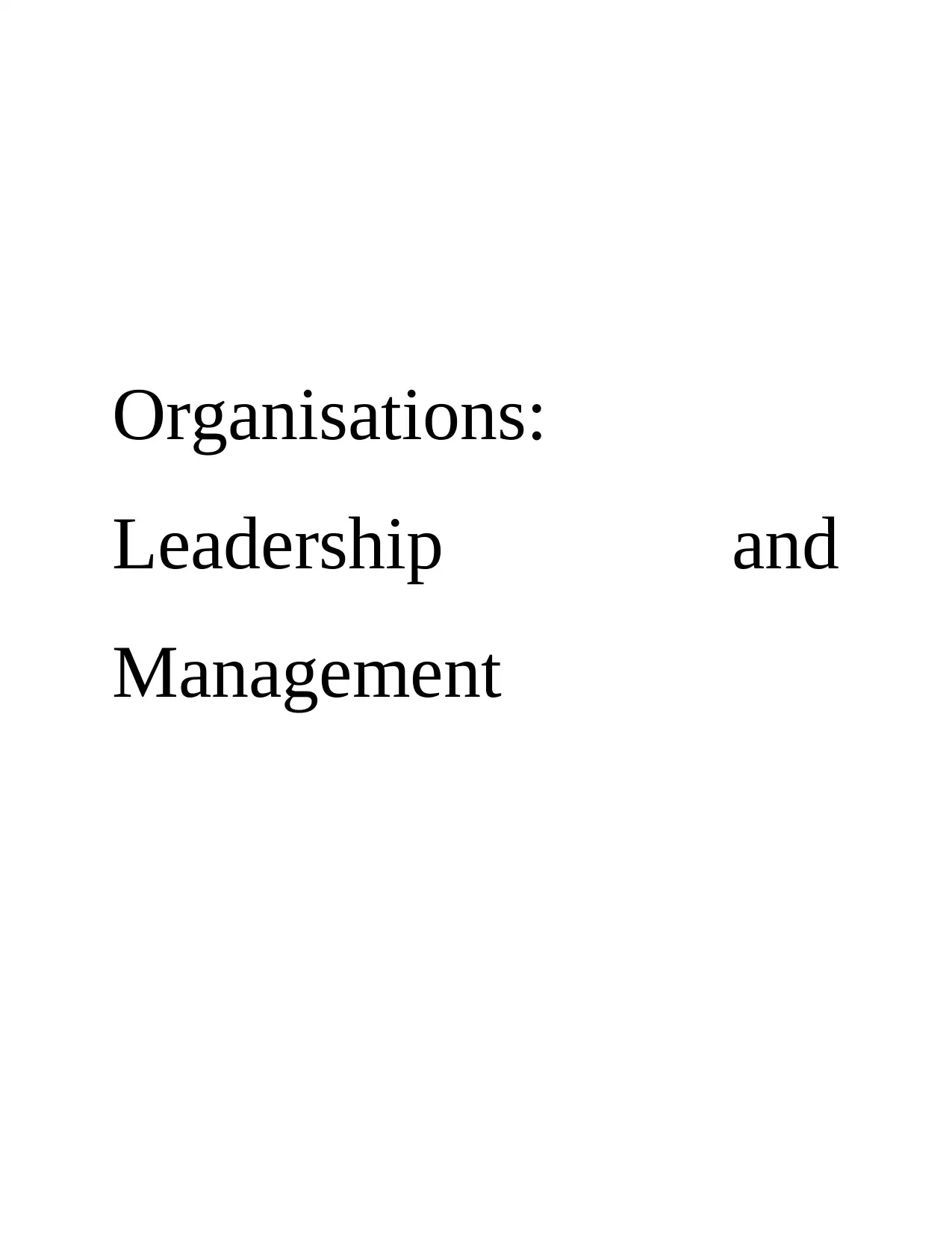
Organisations:
Leadership and
Management
Leadership and
Management
Paraphrase This Document
Need a fresh take? Get an instant paraphrase of this document with our AI Paraphraser
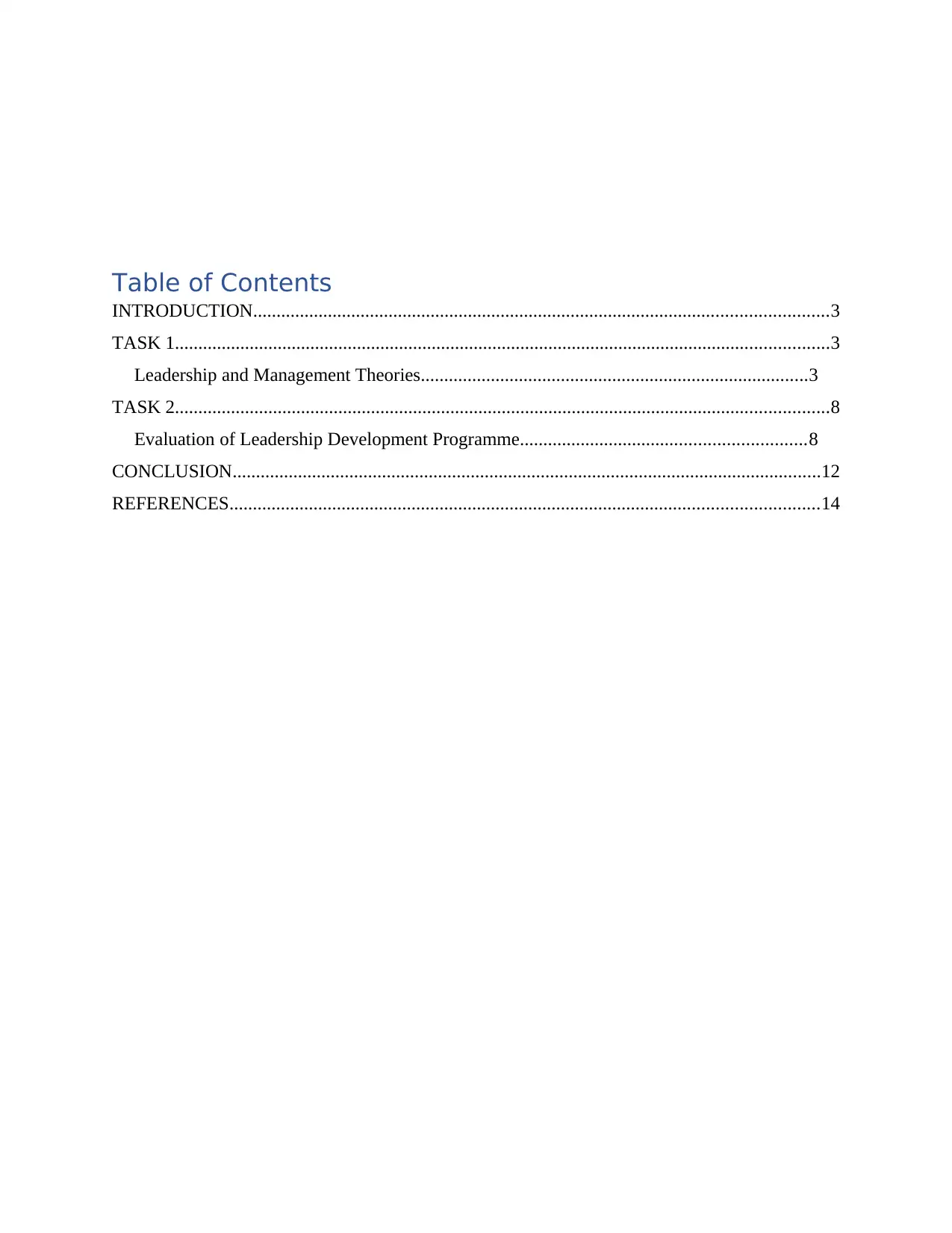
Table of Contents
INTRODUCTION...........................................................................................................................3
TASK 1............................................................................................................................................3
Leadership and Management Theories...................................................................................3
TASK 2............................................................................................................................................8
Evaluation of Leadership Development Programme.............................................................8
CONCLUSION..............................................................................................................................12
REFERENCES..............................................................................................................................14
INTRODUCTION...........................................................................................................................3
TASK 1............................................................................................................................................3
Leadership and Management Theories...................................................................................3
TASK 2............................................................................................................................................8
Evaluation of Leadership Development Programme.............................................................8
CONCLUSION..............................................................................................................................12
REFERENCES..............................................................................................................................14
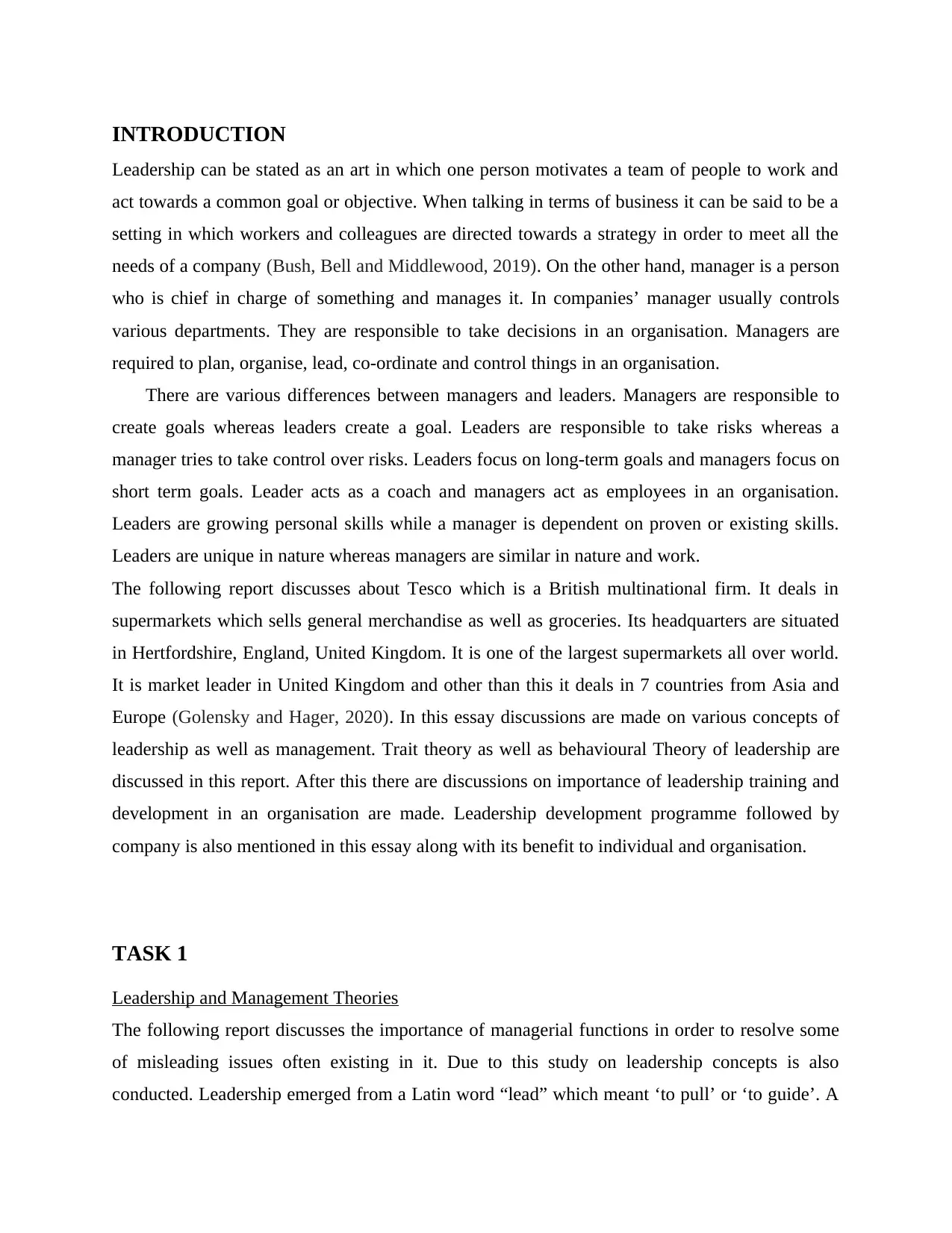
INTRODUCTION
Leadership can be stated as an art in which one person motivates a team of people to work and
act towards a common goal or objective. When talking in terms of business it can be said to be a
setting in which workers and colleagues are directed towards a strategy in order to meet all the
needs of a company (Bush, Bell and Middlewood, 2019). On the other hand, manager is a person
who is chief in charge of something and manages it. In companies’ manager usually controls
various departments. They are responsible to take decisions in an organisation. Managers are
required to plan, organise, lead, co-ordinate and control things in an organisation.
There are various differences between managers and leaders. Managers are responsible to
create goals whereas leaders create a goal. Leaders are responsible to take risks whereas a
manager tries to take control over risks. Leaders focus on long-term goals and managers focus on
short term goals. Leader acts as a coach and managers act as employees in an organisation.
Leaders are growing personal skills while a manager is dependent on proven or existing skills.
Leaders are unique in nature whereas managers are similar in nature and work.
The following report discusses about Tesco which is a British multinational firm. It deals in
supermarkets which sells general merchandise as well as groceries. Its headquarters are situated
in Hertfordshire, England, United Kingdom. It is one of the largest supermarkets all over world.
It is market leader in United Kingdom and other than this it deals in 7 countries from Asia and
Europe (Golensky and Hager, 2020). In this essay discussions are made on various concepts of
leadership as well as management. Trait theory as well as behavioural Theory of leadership are
discussed in this report. After this there are discussions on importance of leadership training and
development in an organisation are made. Leadership development programme followed by
company is also mentioned in this essay along with its benefit to individual and organisation.
TASK 1
Leadership and Management Theories
The following report discusses the importance of managerial functions in order to resolve some
of misleading issues often existing in it. Due to this study on leadership concepts is also
conducted. Leadership emerged from a Latin word “lead” which meant ‘to pull’ or ‘to guide’. A
Leadership can be stated as an art in which one person motivates a team of people to work and
act towards a common goal or objective. When talking in terms of business it can be said to be a
setting in which workers and colleagues are directed towards a strategy in order to meet all the
needs of a company (Bush, Bell and Middlewood, 2019). On the other hand, manager is a person
who is chief in charge of something and manages it. In companies’ manager usually controls
various departments. They are responsible to take decisions in an organisation. Managers are
required to plan, organise, lead, co-ordinate and control things in an organisation.
There are various differences between managers and leaders. Managers are responsible to
create goals whereas leaders create a goal. Leaders are responsible to take risks whereas a
manager tries to take control over risks. Leaders focus on long-term goals and managers focus on
short term goals. Leader acts as a coach and managers act as employees in an organisation.
Leaders are growing personal skills while a manager is dependent on proven or existing skills.
Leaders are unique in nature whereas managers are similar in nature and work.
The following report discusses about Tesco which is a British multinational firm. It deals in
supermarkets which sells general merchandise as well as groceries. Its headquarters are situated
in Hertfordshire, England, United Kingdom. It is one of the largest supermarkets all over world.
It is market leader in United Kingdom and other than this it deals in 7 countries from Asia and
Europe (Golensky and Hager, 2020). In this essay discussions are made on various concepts of
leadership as well as management. Trait theory as well as behavioural Theory of leadership are
discussed in this report. After this there are discussions on importance of leadership training and
development in an organisation are made. Leadership development programme followed by
company is also mentioned in this essay along with its benefit to individual and organisation.
TASK 1
Leadership and Management Theories
The following report discusses the importance of managerial functions in order to resolve some
of misleading issues often existing in it. Due to this study on leadership concepts is also
conducted. Leadership emerged from a Latin word “lead” which meant ‘to pull’ or ‘to guide’. A
⊘ This is a preview!⊘
Do you want full access?
Subscribe today to unlock all pages.

Trusted by 1+ million students worldwide
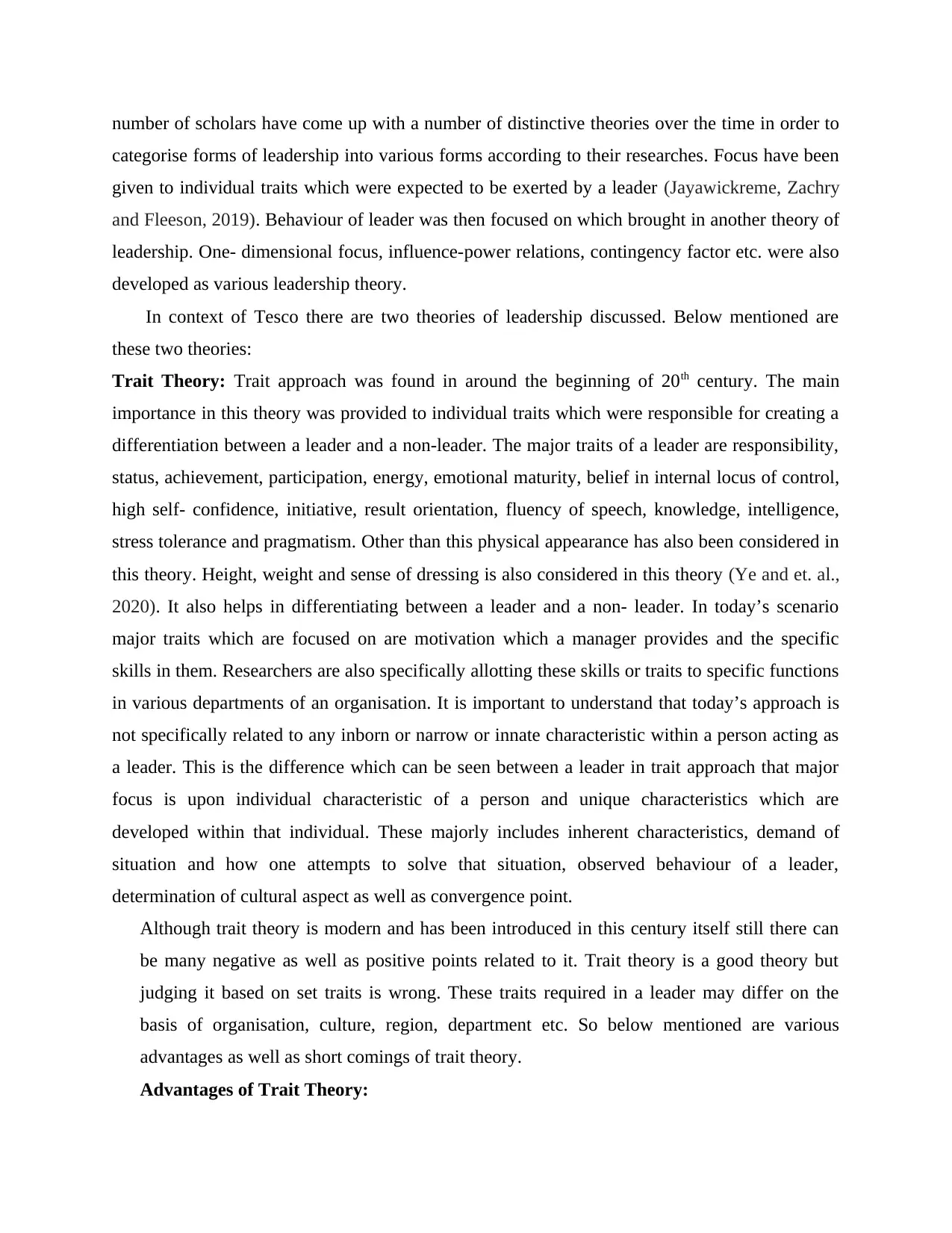
number of scholars have come up with a number of distinctive theories over the time in order to
categorise forms of leadership into various forms according to their researches. Focus have been
given to individual traits which were expected to be exerted by a leader (Jayawickreme, Zachry
and Fleeson, 2019). Behaviour of leader was then focused on which brought in another theory of
leadership. One- dimensional focus, influence-power relations, contingency factor etc. were also
developed as various leadership theory.
In context of Tesco there are two theories of leadership discussed. Below mentioned are
these two theories:
Trait Theory: Trait approach was found in around the beginning of 20th century. The main
importance in this theory was provided to individual traits which were responsible for creating a
differentiation between a leader and a non-leader. The major traits of a leader are responsibility,
status, achievement, participation, energy, emotional maturity, belief in internal locus of control,
high self- confidence, initiative, result orientation, fluency of speech, knowledge, intelligence,
stress tolerance and pragmatism. Other than this physical appearance has also been considered in
this theory. Height, weight and sense of dressing is also considered in this theory (Ye and et. al.,
2020). It also helps in differentiating between a leader and a non- leader. In today’s scenario
major traits which are focused on are motivation which a manager provides and the specific
skills in them. Researchers are also specifically allotting these skills or traits to specific functions
in various departments of an organisation. It is important to understand that today’s approach is
not specifically related to any inborn or narrow or innate characteristic within a person acting as
a leader. This is the difference which can be seen between a leader in trait approach that major
focus is upon individual characteristic of a person and unique characteristics which are
developed within that individual. These majorly includes inherent characteristics, demand of
situation and how one attempts to solve that situation, observed behaviour of a leader,
determination of cultural aspect as well as convergence point.
Although trait theory is modern and has been introduced in this century itself still there can
be many negative as well as positive points related to it. Trait theory is a good theory but
judging it based on set traits is wrong. These traits required in a leader may differ on the
basis of organisation, culture, region, department etc. So below mentioned are various
advantages as well as short comings of trait theory.
Advantages of Trait Theory:
categorise forms of leadership into various forms according to their researches. Focus have been
given to individual traits which were expected to be exerted by a leader (Jayawickreme, Zachry
and Fleeson, 2019). Behaviour of leader was then focused on which brought in another theory of
leadership. One- dimensional focus, influence-power relations, contingency factor etc. were also
developed as various leadership theory.
In context of Tesco there are two theories of leadership discussed. Below mentioned are
these two theories:
Trait Theory: Trait approach was found in around the beginning of 20th century. The main
importance in this theory was provided to individual traits which were responsible for creating a
differentiation between a leader and a non-leader. The major traits of a leader are responsibility,
status, achievement, participation, energy, emotional maturity, belief in internal locus of control,
high self- confidence, initiative, result orientation, fluency of speech, knowledge, intelligence,
stress tolerance and pragmatism. Other than this physical appearance has also been considered in
this theory. Height, weight and sense of dressing is also considered in this theory (Ye and et. al.,
2020). It also helps in differentiating between a leader and a non- leader. In today’s scenario
major traits which are focused on are motivation which a manager provides and the specific
skills in them. Researchers are also specifically allotting these skills or traits to specific functions
in various departments of an organisation. It is important to understand that today’s approach is
not specifically related to any inborn or narrow or innate characteristic within a person acting as
a leader. This is the difference which can be seen between a leader in trait approach that major
focus is upon individual characteristic of a person and unique characteristics which are
developed within that individual. These majorly includes inherent characteristics, demand of
situation and how one attempts to solve that situation, observed behaviour of a leader,
determination of cultural aspect as well as convergence point.
Although trait theory is modern and has been introduced in this century itself still there can
be many negative as well as positive points related to it. Trait theory is a good theory but
judging it based on set traits is wrong. These traits required in a leader may differ on the
basis of organisation, culture, region, department etc. So below mentioned are various
advantages as well as short comings of trait theory.
Advantages of Trait Theory:
Paraphrase This Document
Need a fresh take? Get an instant paraphrase of this document with our AI Paraphraser
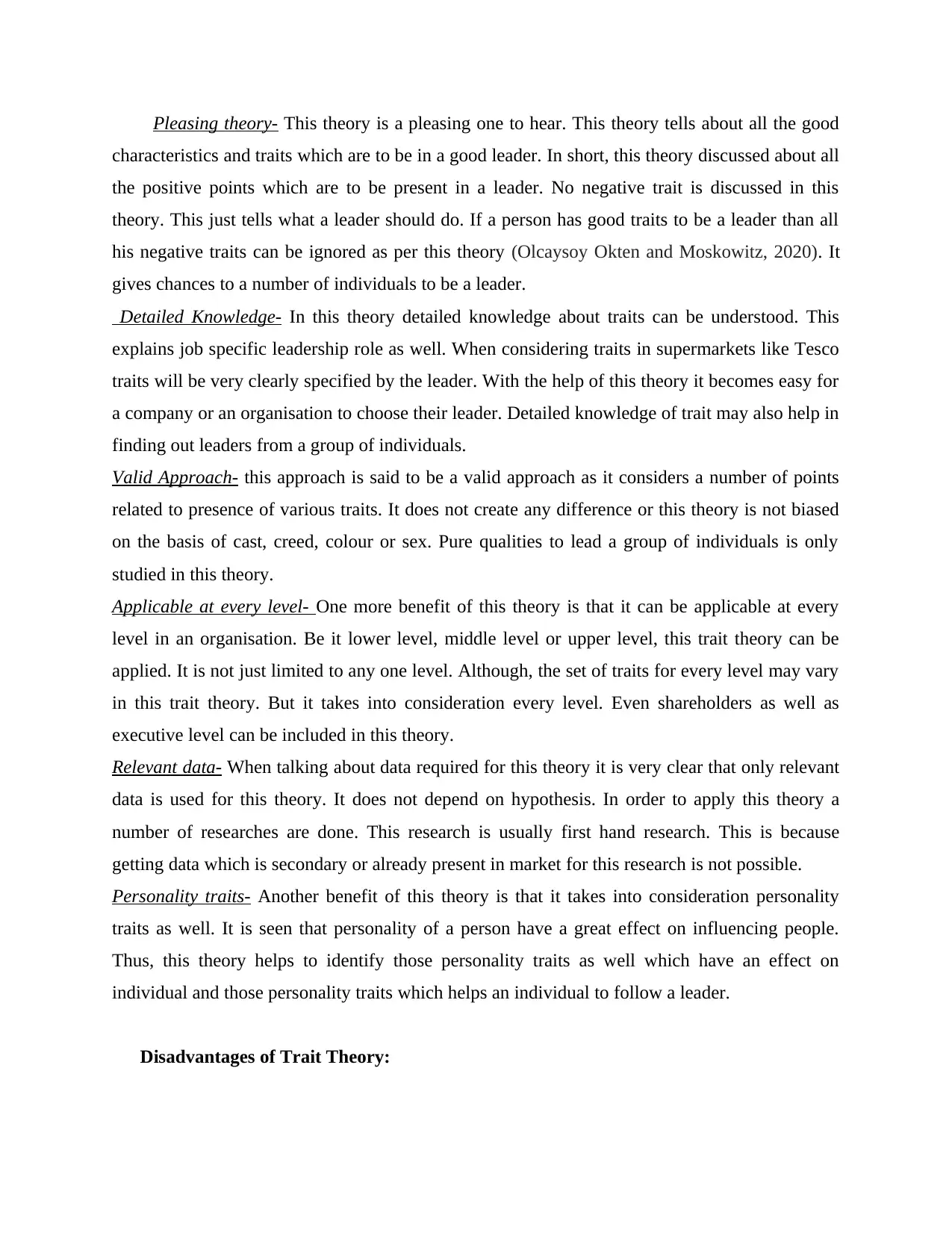
Pleasing theory- This theory is a pleasing one to hear. This theory tells about all the good
characteristics and traits which are to be in a good leader. In short, this theory discussed about all
the positive points which are to be present in a leader. No negative trait is discussed in this
theory. This just tells what a leader should do. If a person has good traits to be a leader than all
his negative traits can be ignored as per this theory (Olcaysoy Okten and Moskowitz, 2020). It
gives chances to a number of individuals to be a leader.
Detailed Knowledge- In this theory detailed knowledge about traits can be understood. This
explains job specific leadership role as well. When considering traits in supermarkets like Tesco
traits will be very clearly specified by the leader. With the help of this theory it becomes easy for
a company or an organisation to choose their leader. Detailed knowledge of trait may also help in
finding out leaders from a group of individuals.
Valid Approach- this approach is said to be a valid approach as it considers a number of points
related to presence of various traits. It does not create any difference or this theory is not biased
on the basis of cast, creed, colour or sex. Pure qualities to lead a group of individuals is only
studied in this theory.
Applicable at every level- One more benefit of this theory is that it can be applicable at every
level in an organisation. Be it lower level, middle level or upper level, this trait theory can be
applied. It is not just limited to any one level. Although, the set of traits for every level may vary
in this trait theory. But it takes into consideration every level. Even shareholders as well as
executive level can be included in this theory.
Relevant data- When talking about data required for this theory it is very clear that only relevant
data is used for this theory. It does not depend on hypothesis. In order to apply this theory a
number of researches are done. This research is usually first hand research. This is because
getting data which is secondary or already present in market for this research is not possible.
Personality traits- Another benefit of this theory is that it takes into consideration personality
traits as well. It is seen that personality of a person have a great effect on influencing people.
Thus, this theory helps to identify those personality traits as well which have an effect on
individual and those personality traits which helps an individual to follow a leader.
Disadvantages of Trait Theory:
characteristics and traits which are to be in a good leader. In short, this theory discussed about all
the positive points which are to be present in a leader. No negative trait is discussed in this
theory. This just tells what a leader should do. If a person has good traits to be a leader than all
his negative traits can be ignored as per this theory (Olcaysoy Okten and Moskowitz, 2020). It
gives chances to a number of individuals to be a leader.
Detailed Knowledge- In this theory detailed knowledge about traits can be understood. This
explains job specific leadership role as well. When considering traits in supermarkets like Tesco
traits will be very clearly specified by the leader. With the help of this theory it becomes easy for
a company or an organisation to choose their leader. Detailed knowledge of trait may also help in
finding out leaders from a group of individuals.
Valid Approach- this approach is said to be a valid approach as it considers a number of points
related to presence of various traits. It does not create any difference or this theory is not biased
on the basis of cast, creed, colour or sex. Pure qualities to lead a group of individuals is only
studied in this theory.
Applicable at every level- One more benefit of this theory is that it can be applicable at every
level in an organisation. Be it lower level, middle level or upper level, this trait theory can be
applied. It is not just limited to any one level. Although, the set of traits for every level may vary
in this trait theory. But it takes into consideration every level. Even shareholders as well as
executive level can be included in this theory.
Relevant data- When talking about data required for this theory it is very clear that only relevant
data is used for this theory. It does not depend on hypothesis. In order to apply this theory a
number of researches are done. This research is usually first hand research. This is because
getting data which is secondary or already present in market for this research is not possible.
Personality traits- Another benefit of this theory is that it takes into consideration personality
traits as well. It is seen that personality of a person have a great effect on influencing people.
Thus, this theory helps to identify those personality traits as well which have an effect on
individual and those personality traits which helps an individual to follow a leader.
Disadvantages of Trait Theory:
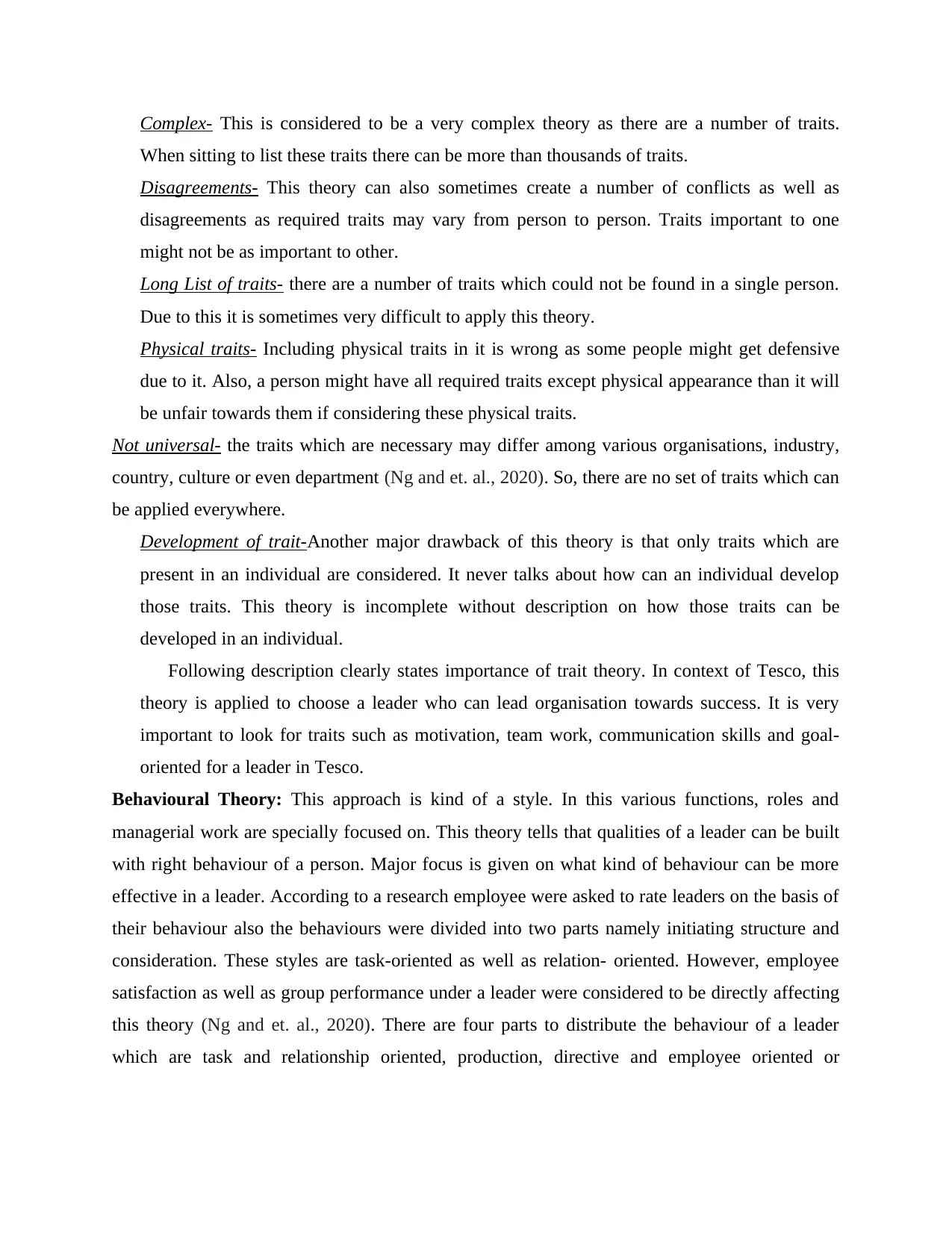
Complex- This is considered to be a very complex theory as there are a number of traits.
When sitting to list these traits there can be more than thousands of traits.
Disagreements- This theory can also sometimes create a number of conflicts as well as
disagreements as required traits may vary from person to person. Traits important to one
might not be as important to other.
Long List of traits- there are a number of traits which could not be found in a single person.
Due to this it is sometimes very difficult to apply this theory.
Physical traits- Including physical traits in it is wrong as some people might get defensive
due to it. Also, a person might have all required traits except physical appearance than it will
be unfair towards them if considering these physical traits.
Not universal- the traits which are necessary may differ among various organisations, industry,
country, culture or even department (Ng and et. al., 2020). So, there are no set of traits which can
be applied everywhere.
Development of trait-Another major drawback of this theory is that only traits which are
present in an individual are considered. It never talks about how can an individual develop
those traits. This theory is incomplete without description on how those traits can be
developed in an individual.
Following description clearly states importance of trait theory. In context of Tesco, this
theory is applied to choose a leader who can lead organisation towards success. It is very
important to look for traits such as motivation, team work, communication skills and goal-
oriented for a leader in Tesco.
Behavioural Theory: This approach is kind of a style. In this various functions, roles and
managerial work are specially focused on. This theory tells that qualities of a leader can be built
with right behaviour of a person. Major focus is given on what kind of behaviour can be more
effective in a leader. According to a research employee were asked to rate leaders on the basis of
their behaviour also the behaviours were divided into two parts namely initiating structure and
consideration. These styles are task-oriented as well as relation- oriented. However, employee
satisfaction as well as group performance under a leader were considered to be directly affecting
this theory (Ng and et. al., 2020). There are four parts to distribute the behaviour of a leader
which are task and relationship oriented, production, directive and employee oriented or
When sitting to list these traits there can be more than thousands of traits.
Disagreements- This theory can also sometimes create a number of conflicts as well as
disagreements as required traits may vary from person to person. Traits important to one
might not be as important to other.
Long List of traits- there are a number of traits which could not be found in a single person.
Due to this it is sometimes very difficult to apply this theory.
Physical traits- Including physical traits in it is wrong as some people might get defensive
due to it. Also, a person might have all required traits except physical appearance than it will
be unfair towards them if considering these physical traits.
Not universal- the traits which are necessary may differ among various organisations, industry,
country, culture or even department (Ng and et. al., 2020). So, there are no set of traits which can
be applied everywhere.
Development of trait-Another major drawback of this theory is that only traits which are
present in an individual are considered. It never talks about how can an individual develop
those traits. This theory is incomplete without description on how those traits can be
developed in an individual.
Following description clearly states importance of trait theory. In context of Tesco, this
theory is applied to choose a leader who can lead organisation towards success. It is very
important to look for traits such as motivation, team work, communication skills and goal-
oriented for a leader in Tesco.
Behavioural Theory: This approach is kind of a style. In this various functions, roles and
managerial work are specially focused on. This theory tells that qualities of a leader can be built
with right behaviour of a person. Major focus is given on what kind of behaviour can be more
effective in a leader. According to a research employee were asked to rate leaders on the basis of
their behaviour also the behaviours were divided into two parts namely initiating structure and
consideration. These styles are task-oriented as well as relation- oriented. However, employee
satisfaction as well as group performance under a leader were considered to be directly affecting
this theory (Ng and et. al., 2020). There are four parts to distribute the behaviour of a leader
which are task and relationship oriented, production, directive and employee oriented or
⊘ This is a preview!⊘
Do you want full access?
Subscribe today to unlock all pages.

Trusted by 1+ million students worldwide
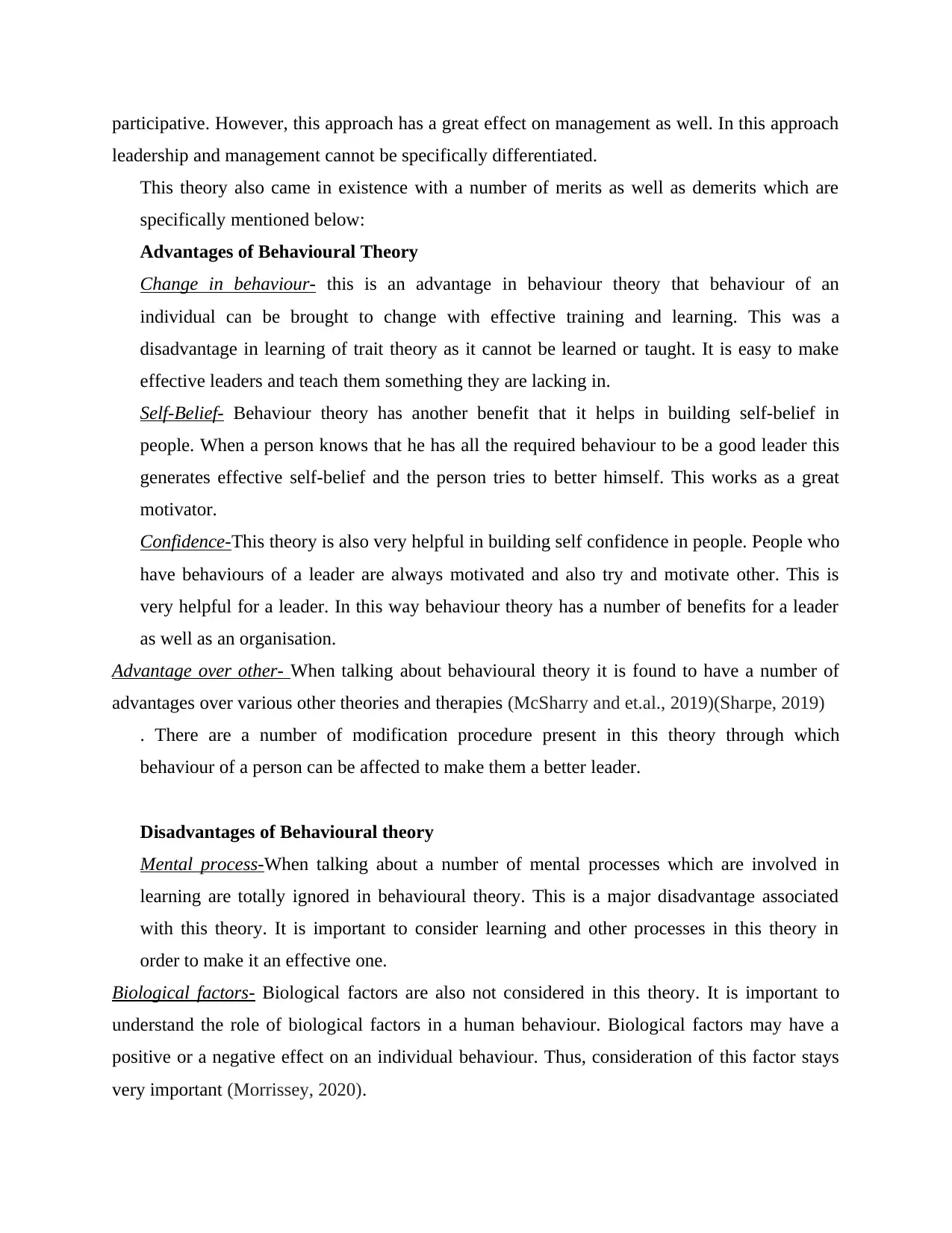
participative. However, this approach has a great effect on management as well. In this approach
leadership and management cannot be specifically differentiated.
This theory also came in existence with a number of merits as well as demerits which are
specifically mentioned below:
Advantages of Behavioural Theory
Change in behaviour- this is an advantage in behaviour theory that behaviour of an
individual can be brought to change with effective training and learning. This was a
disadvantage in learning of trait theory as it cannot be learned or taught. It is easy to make
effective leaders and teach them something they are lacking in.
Self-Belief- Behaviour theory has another benefit that it helps in building self-belief in
people. When a person knows that he has all the required behaviour to be a good leader this
generates effective self-belief and the person tries to better himself. This works as a great
motivator.
Confidence-This theory is also very helpful in building self confidence in people. People who
have behaviours of a leader are always motivated and also try and motivate other. This is
very helpful for a leader. In this way behaviour theory has a number of benefits for a leader
as well as an organisation.
Advantage over other- When talking about behavioural theory it is found to have a number of
advantages over various other theories and therapies (McSharry and et.al., 2019)(Sharpe, 2019)
. There are a number of modification procedure present in this theory through which
behaviour of a person can be affected to make them a better leader.
Disadvantages of Behavioural theory
Mental process-When talking about a number of mental processes which are involved in
learning are totally ignored in behavioural theory. This is a major disadvantage associated
with this theory. It is important to consider learning and other processes in this theory in
order to make it an effective one.
Biological factors- Biological factors are also not considered in this theory. It is important to
understand the role of biological factors in a human behaviour. Biological factors may have a
positive or a negative effect on an individual behaviour. Thus, consideration of this factor stays
very important (Morrissey, 2020).
leadership and management cannot be specifically differentiated.
This theory also came in existence with a number of merits as well as demerits which are
specifically mentioned below:
Advantages of Behavioural Theory
Change in behaviour- this is an advantage in behaviour theory that behaviour of an
individual can be brought to change with effective training and learning. This was a
disadvantage in learning of trait theory as it cannot be learned or taught. It is easy to make
effective leaders and teach them something they are lacking in.
Self-Belief- Behaviour theory has another benefit that it helps in building self-belief in
people. When a person knows that he has all the required behaviour to be a good leader this
generates effective self-belief and the person tries to better himself. This works as a great
motivator.
Confidence-This theory is also very helpful in building self confidence in people. People who
have behaviours of a leader are always motivated and also try and motivate other. This is
very helpful for a leader. In this way behaviour theory has a number of benefits for a leader
as well as an organisation.
Advantage over other- When talking about behavioural theory it is found to have a number of
advantages over various other theories and therapies (McSharry and et.al., 2019)(Sharpe, 2019)
. There are a number of modification procedure present in this theory through which
behaviour of a person can be affected to make them a better leader.
Disadvantages of Behavioural theory
Mental process-When talking about a number of mental processes which are involved in
learning are totally ignored in behavioural theory. This is a major disadvantage associated
with this theory. It is important to consider learning and other processes in this theory in
order to make it an effective one.
Biological factors- Biological factors are also not considered in this theory. It is important to
understand the role of biological factors in a human behaviour. Biological factors may have a
positive or a negative effect on an individual behaviour. Thus, consideration of this factor stays
very important (Morrissey, 2020).
Paraphrase This Document
Need a fresh take? Get an instant paraphrase of this document with our AI Paraphraser
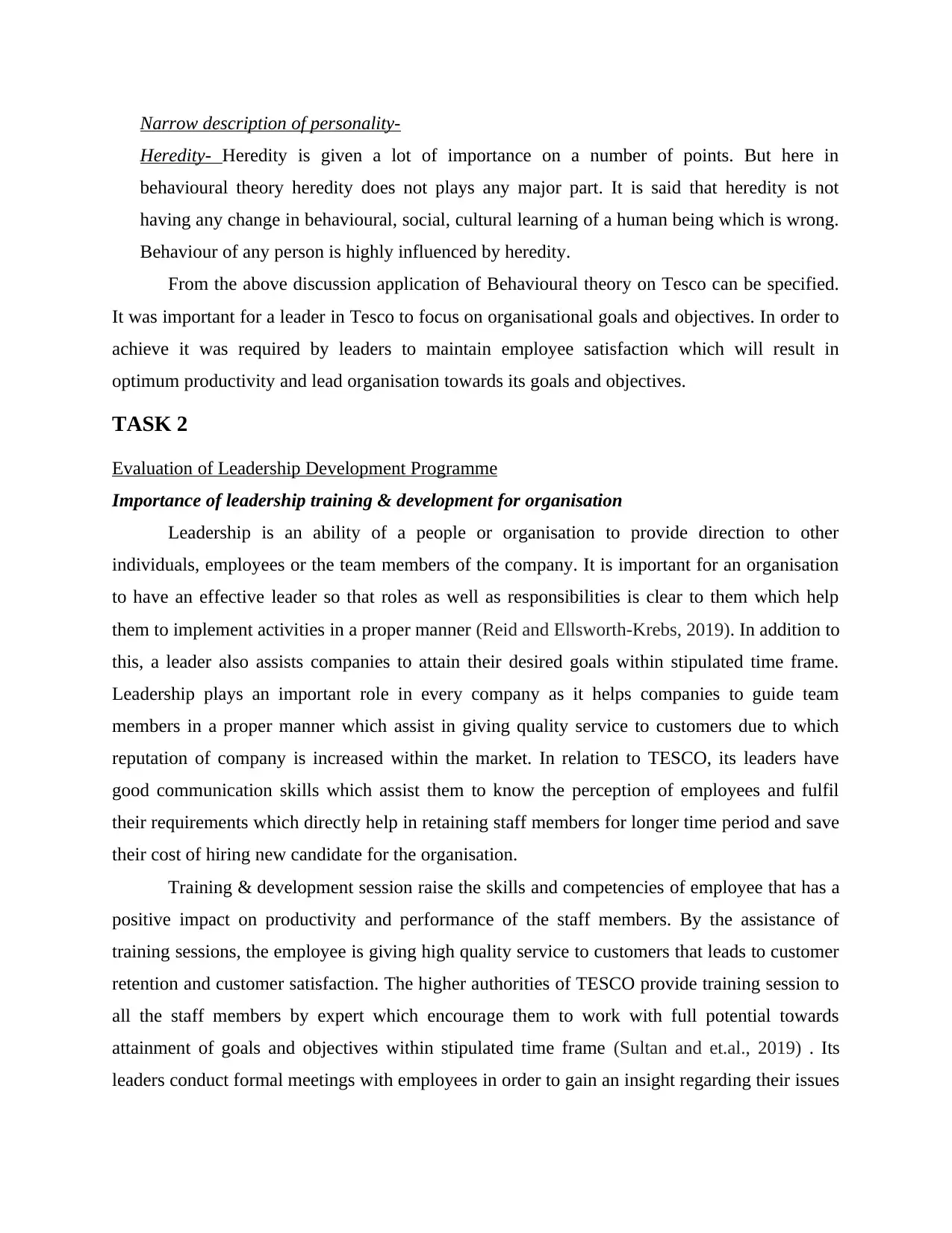
Narrow description of personality-
Heredity- Heredity is given a lot of importance on a number of points. But here in
behavioural theory heredity does not plays any major part. It is said that heredity is not
having any change in behavioural, social, cultural learning of a human being which is wrong.
Behaviour of any person is highly influenced by heredity.
From the above discussion application of Behavioural theory on Tesco can be specified.
It was important for a leader in Tesco to focus on organisational goals and objectives. In order to
achieve it was required by leaders to maintain employee satisfaction which will result in
optimum productivity and lead organisation towards its goals and objectives.
TASK 2
Evaluation of Leadership Development Programme
Importance of leadership training & development for organisation
Leadership is an ability of a people or organisation to provide direction to other
individuals, employees or the team members of the company. It is important for an organisation
to have an effective leader so that roles as well as responsibilities is clear to them which help
them to implement activities in a proper manner (Reid and Ellsworth-Krebs, 2019). In addition to
this, a leader also assists companies to attain their desired goals within stipulated time frame.
Leadership plays an important role in every company as it helps companies to guide team
members in a proper manner which assist in giving quality service to customers due to which
reputation of company is increased within the market. In relation to TESCO, its leaders have
good communication skills which assist them to know the perception of employees and fulfil
their requirements which directly help in retaining staff members for longer time period and save
their cost of hiring new candidate for the organisation.
Training & development session raise the skills and competencies of employee that has a
positive impact on productivity and performance of the staff members. By the assistance of
training sessions, the employee is giving high quality service to customers that leads to customer
retention and customer satisfaction. The higher authorities of TESCO provide training session to
all the staff members by expert which encourage them to work with full potential towards
attainment of goals and objectives within stipulated time frame (Sultan and et.al., 2019) . Its
leaders conduct formal meetings with employees in order to gain an insight regarding their issues
Heredity- Heredity is given a lot of importance on a number of points. But here in
behavioural theory heredity does not plays any major part. It is said that heredity is not
having any change in behavioural, social, cultural learning of a human being which is wrong.
Behaviour of any person is highly influenced by heredity.
From the above discussion application of Behavioural theory on Tesco can be specified.
It was important for a leader in Tesco to focus on organisational goals and objectives. In order to
achieve it was required by leaders to maintain employee satisfaction which will result in
optimum productivity and lead organisation towards its goals and objectives.
TASK 2
Evaluation of Leadership Development Programme
Importance of leadership training & development for organisation
Leadership is an ability of a people or organisation to provide direction to other
individuals, employees or the team members of the company. It is important for an organisation
to have an effective leader so that roles as well as responsibilities is clear to them which help
them to implement activities in a proper manner (Reid and Ellsworth-Krebs, 2019). In addition to
this, a leader also assists companies to attain their desired goals within stipulated time frame.
Leadership plays an important role in every company as it helps companies to guide team
members in a proper manner which assist in giving quality service to customers due to which
reputation of company is increased within the market. In relation to TESCO, its leaders have
good communication skills which assist them to know the perception of employees and fulfil
their requirements which directly help in retaining staff members for longer time period and save
their cost of hiring new candidate for the organisation.
Training & development session raise the skills and competencies of employee that has a
positive impact on productivity and performance of the staff members. By the assistance of
training sessions, the employee is giving high quality service to customers that leads to customer
retention and customer satisfaction. The higher authorities of TESCO provide training session to
all the staff members by expert which encourage them to work with full potential towards
attainment of goals and objectives within stipulated time frame (Sultan and et.al., 2019) . Its
leaders conduct formal meetings with employees in order to gain an insight regarding their issues
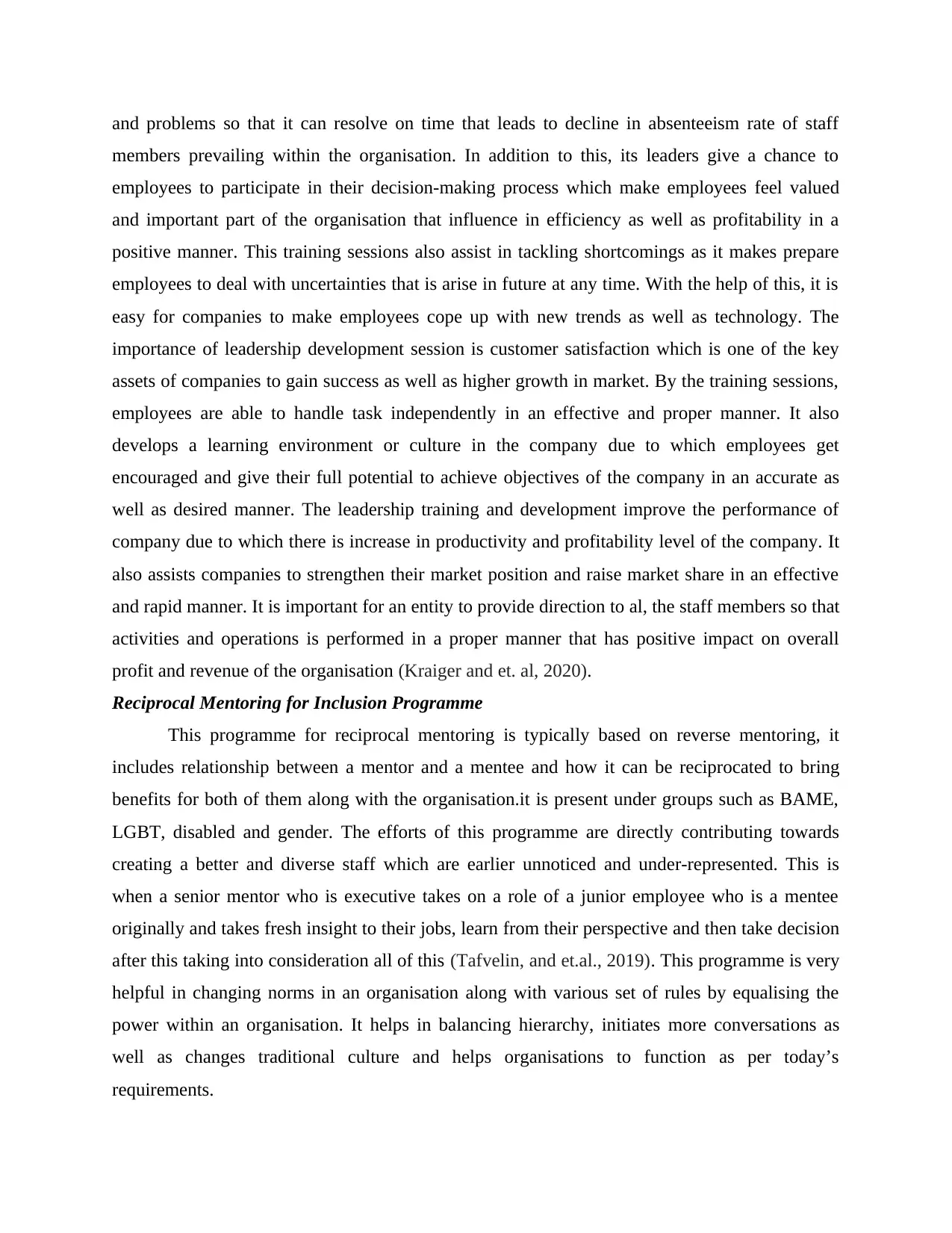
and problems so that it can resolve on time that leads to decline in absenteeism rate of staff
members prevailing within the organisation. In addition to this, its leaders give a chance to
employees to participate in their decision-making process which make employees feel valued
and important part of the organisation that influence in efficiency as well as profitability in a
positive manner. This training sessions also assist in tackling shortcomings as it makes prepare
employees to deal with uncertainties that is arise in future at any time. With the help of this, it is
easy for companies to make employees cope up with new trends as well as technology. The
importance of leadership development session is customer satisfaction which is one of the key
assets of companies to gain success as well as higher growth in market. By the training sessions,
employees are able to handle task independently in an effective and proper manner. It also
develops a learning environment or culture in the company due to which employees get
encouraged and give their full potential to achieve objectives of the company in an accurate as
well as desired manner. The leadership training and development improve the performance of
company due to which there is increase in productivity and profitability level of the company. It
also assists companies to strengthen their market position and raise market share in an effective
and rapid manner. It is important for an entity to provide direction to al, the staff members so that
activities and operations is performed in a proper manner that has positive impact on overall
profit and revenue of the organisation (Kraiger and et. al, 2020).
Reciprocal Mentoring for Inclusion Programme
This programme for reciprocal mentoring is typically based on reverse mentoring, it
includes relationship between a mentor and a mentee and how it can be reciprocated to bring
benefits for both of them along with the organisation.it is present under groups such as BAME,
LGBT, disabled and gender. The efforts of this programme are directly contributing towards
creating a better and diverse staff which are earlier unnoticed and under-represented. This is
when a senior mentor who is executive takes on a role of a junior employee who is a mentee
originally and takes fresh insight to their jobs, learn from their perspective and then take decision
after this taking into consideration all of this (Tafvelin, and et.al., 2019). This programme is very
helpful in changing norms in an organisation along with various set of rules by equalising the
power within an organisation. It helps in balancing hierarchy, initiates more conversations as
well as changes traditional culture and helps organisations to function as per today’s
requirements.
members prevailing within the organisation. In addition to this, its leaders give a chance to
employees to participate in their decision-making process which make employees feel valued
and important part of the organisation that influence in efficiency as well as profitability in a
positive manner. This training sessions also assist in tackling shortcomings as it makes prepare
employees to deal with uncertainties that is arise in future at any time. With the help of this, it is
easy for companies to make employees cope up with new trends as well as technology. The
importance of leadership development session is customer satisfaction which is one of the key
assets of companies to gain success as well as higher growth in market. By the training sessions,
employees are able to handle task independently in an effective and proper manner. It also
develops a learning environment or culture in the company due to which employees get
encouraged and give their full potential to achieve objectives of the company in an accurate as
well as desired manner. The leadership training and development improve the performance of
company due to which there is increase in productivity and profitability level of the company. It
also assists companies to strengthen their market position and raise market share in an effective
and rapid manner. It is important for an entity to provide direction to al, the staff members so that
activities and operations is performed in a proper manner that has positive impact on overall
profit and revenue of the organisation (Kraiger and et. al, 2020).
Reciprocal Mentoring for Inclusion Programme
This programme for reciprocal mentoring is typically based on reverse mentoring, it
includes relationship between a mentor and a mentee and how it can be reciprocated to bring
benefits for both of them along with the organisation.it is present under groups such as BAME,
LGBT, disabled and gender. The efforts of this programme are directly contributing towards
creating a better and diverse staff which are earlier unnoticed and under-represented. This is
when a senior mentor who is executive takes on a role of a junior employee who is a mentee
originally and takes fresh insight to their jobs, learn from their perspective and then take decision
after this taking into consideration all of this (Tafvelin, and et.al., 2019). This programme is very
helpful in changing norms in an organisation along with various set of rules by equalising the
power within an organisation. It helps in balancing hierarchy, initiates more conversations as
well as changes traditional culture and helps organisations to function as per today’s
requirements.
⊘ This is a preview!⊘
Do you want full access?
Subscribe today to unlock all pages.

Trusted by 1+ million students worldwide
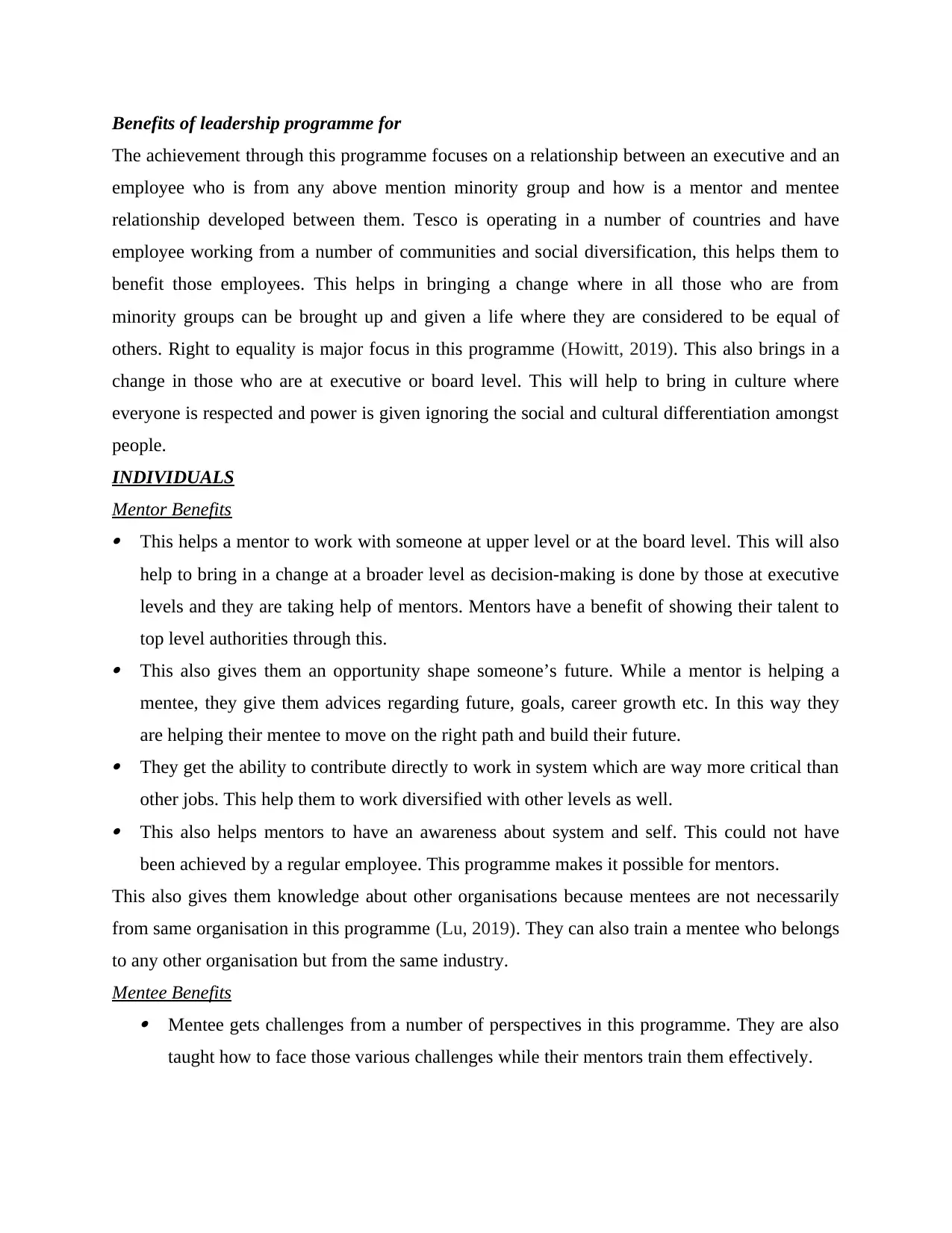
Benefits of leadership programme for
The achievement through this programme focuses on a relationship between an executive and an
employee who is from any above mention minority group and how is a mentor and mentee
relationship developed between them. Tesco is operating in a number of countries and have
employee working from a number of communities and social diversification, this helps them to
benefit those employees. This helps in bringing a change where in all those who are from
minority groups can be brought up and given a life where they are considered to be equal of
others. Right to equality is major focus in this programme (Howitt, 2019). This also brings in a
change in those who are at executive or board level. This will help to bring in culture where
everyone is respected and power is given ignoring the social and cultural differentiation amongst
people.
INDIVIDUALS
Mentor Benefits This helps a mentor to work with someone at upper level or at the board level. This will also
help to bring in a change at a broader level as decision-making is done by those at executive
levels and they are taking help of mentors. Mentors have a benefit of showing their talent to
top level authorities through this. This also gives them an opportunity shape someone’s future. While a mentor is helping a
mentee, they give them advices regarding future, goals, career growth etc. In this way they
are helping their mentee to move on the right path and build their future. They get the ability to contribute directly to work in system which are way more critical than
other jobs. This help them to work diversified with other levels as well. This also helps mentors to have an awareness about system and self. This could not have
been achieved by a regular employee. This programme makes it possible for mentors.
This also gives them knowledge about other organisations because mentees are not necessarily
from same organisation in this programme (Lu, 2019). They can also train a mentee who belongs
to any other organisation but from the same industry.
Mentee Benefits Mentee gets challenges from a number of perspectives in this programme. They are also
taught how to face those various challenges while their mentors train them effectively.
The achievement through this programme focuses on a relationship between an executive and an
employee who is from any above mention minority group and how is a mentor and mentee
relationship developed between them. Tesco is operating in a number of countries and have
employee working from a number of communities and social diversification, this helps them to
benefit those employees. This helps in bringing a change where in all those who are from
minority groups can be brought up and given a life where they are considered to be equal of
others. Right to equality is major focus in this programme (Howitt, 2019). This also brings in a
change in those who are at executive or board level. This will help to bring in culture where
everyone is respected and power is given ignoring the social and cultural differentiation amongst
people.
INDIVIDUALS
Mentor Benefits This helps a mentor to work with someone at upper level or at the board level. This will also
help to bring in a change at a broader level as decision-making is done by those at executive
levels and they are taking help of mentors. Mentors have a benefit of showing their talent to
top level authorities through this. This also gives them an opportunity shape someone’s future. While a mentor is helping a
mentee, they give them advices regarding future, goals, career growth etc. In this way they
are helping their mentee to move on the right path and build their future. They get the ability to contribute directly to work in system which are way more critical than
other jobs. This help them to work diversified with other levels as well. This also helps mentors to have an awareness about system and self. This could not have
been achieved by a regular employee. This programme makes it possible for mentors.
This also gives them knowledge about other organisations because mentees are not necessarily
from same organisation in this programme (Lu, 2019). They can also train a mentee who belongs
to any other organisation but from the same industry.
Mentee Benefits Mentee gets challenges from a number of perspectives in this programme. They are also
taught how to face those various challenges while their mentors train them effectively.
Paraphrase This Document
Need a fresh take? Get an instant paraphrase of this document with our AI Paraphraser
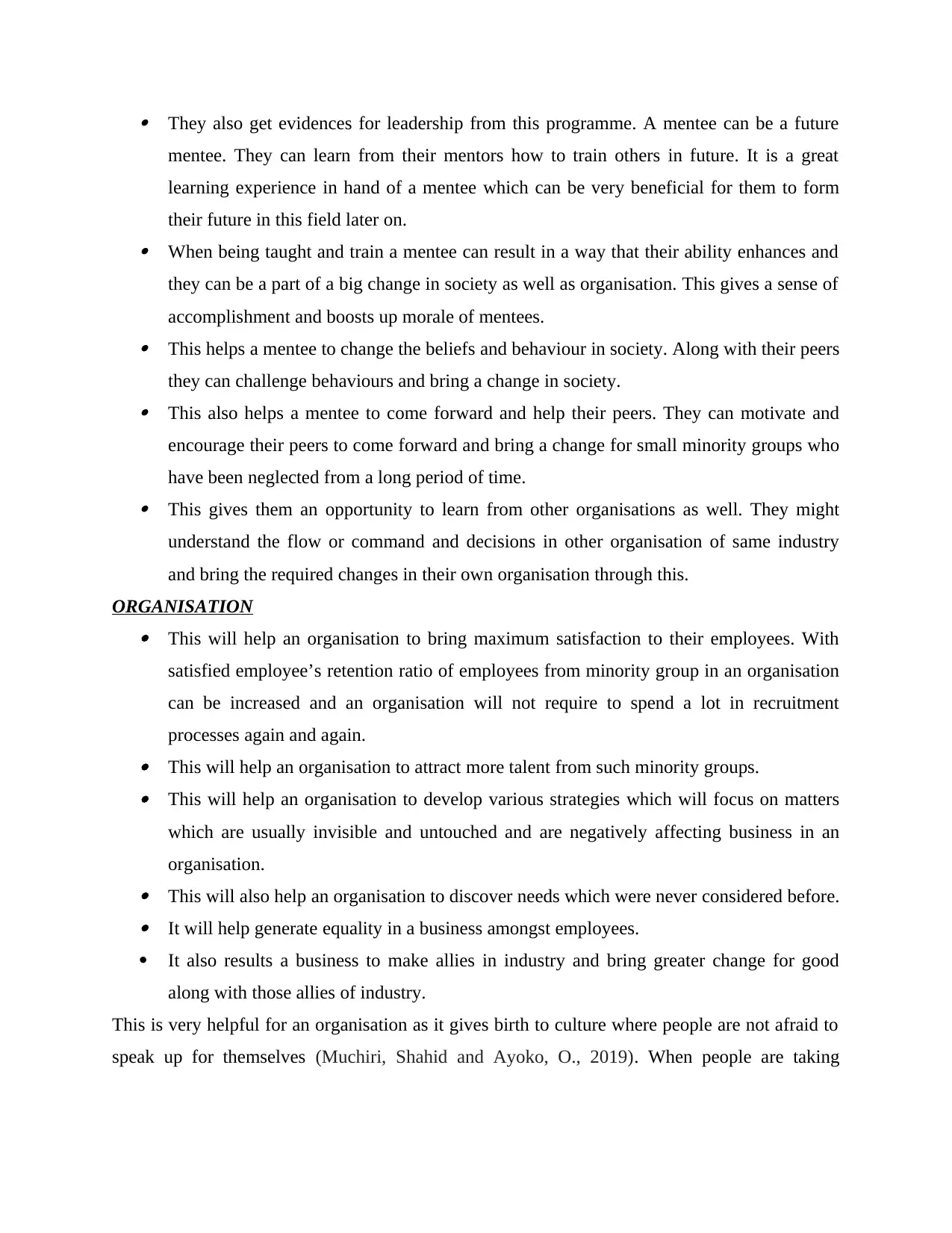
They also get evidences for leadership from this programme. A mentee can be a future
mentee. They can learn from their mentors how to train others in future. It is a great
learning experience in hand of a mentee which can be very beneficial for them to form
their future in this field later on. When being taught and train a mentee can result in a way that their ability enhances and
they can be a part of a big change in society as well as organisation. This gives a sense of
accomplishment and boosts up morale of mentees. This helps a mentee to change the beliefs and behaviour in society. Along with their peers
they can challenge behaviours and bring a change in society. This also helps a mentee to come forward and help their peers. They can motivate and
encourage their peers to come forward and bring a change for small minority groups who
have been neglected from a long period of time. This gives them an opportunity to learn from other organisations as well. They might
understand the flow or command and decisions in other organisation of same industry
and bring the required changes in their own organisation through this.
ORGANISATION This will help an organisation to bring maximum satisfaction to their employees. With
satisfied employee’s retention ratio of employees from minority group in an organisation
can be increased and an organisation will not require to spend a lot in recruitment
processes again and again. This will help an organisation to attract more talent from such minority groups. This will help an organisation to develop various strategies which will focus on matters
which are usually invisible and untouched and are negatively affecting business in an
organisation. This will also help an organisation to discover needs which were never considered before. It will help generate equality in a business amongst employees.
It also results a business to make allies in industry and bring greater change for good
along with those allies of industry.
This is very helpful for an organisation as it gives birth to culture where people are not afraid to
speak up for themselves (Muchiri, Shahid and Ayoko, O., 2019). When people are taking
mentee. They can learn from their mentors how to train others in future. It is a great
learning experience in hand of a mentee which can be very beneficial for them to form
their future in this field later on. When being taught and train a mentee can result in a way that their ability enhances and
they can be a part of a big change in society as well as organisation. This gives a sense of
accomplishment and boosts up morale of mentees. This helps a mentee to change the beliefs and behaviour in society. Along with their peers
they can challenge behaviours and bring a change in society. This also helps a mentee to come forward and help their peers. They can motivate and
encourage their peers to come forward and bring a change for small minority groups who
have been neglected from a long period of time. This gives them an opportunity to learn from other organisations as well. They might
understand the flow or command and decisions in other organisation of same industry
and bring the required changes in their own organisation through this.
ORGANISATION This will help an organisation to bring maximum satisfaction to their employees. With
satisfied employee’s retention ratio of employees from minority group in an organisation
can be increased and an organisation will not require to spend a lot in recruitment
processes again and again. This will help an organisation to attract more talent from such minority groups. This will help an organisation to develop various strategies which will focus on matters
which are usually invisible and untouched and are negatively affecting business in an
organisation. This will also help an organisation to discover needs which were never considered before. It will help generate equality in a business amongst employees.
It also results a business to make allies in industry and bring greater change for good
along with those allies of industry.
This is very helpful for an organisation as it gives birth to culture where people are not afraid to
speak up for themselves (Muchiri, Shahid and Ayoko, O., 2019). When people are taking
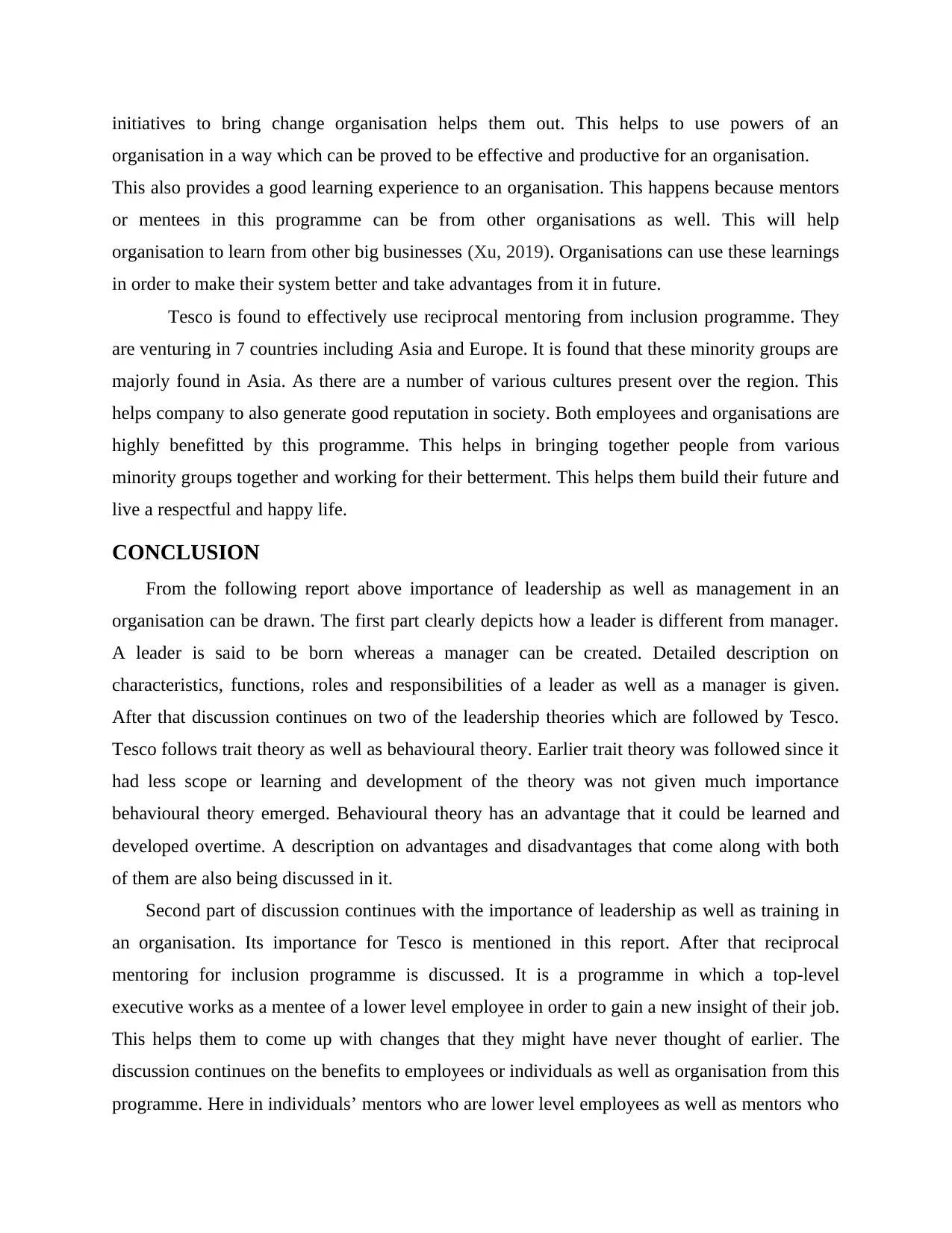
initiatives to bring change organisation helps them out. This helps to use powers of an
organisation in a way which can be proved to be effective and productive for an organisation.
This also provides a good learning experience to an organisation. This happens because mentors
or mentees in this programme can be from other organisations as well. This will help
organisation to learn from other big businesses (Xu, 2019). Organisations can use these learnings
in order to make their system better and take advantages from it in future.
Tesco is found to effectively use reciprocal mentoring from inclusion programme. They
are venturing in 7 countries including Asia and Europe. It is found that these minority groups are
majorly found in Asia. As there are a number of various cultures present over the region. This
helps company to also generate good reputation in society. Both employees and organisations are
highly benefitted by this programme. This helps in bringing together people from various
minority groups together and working for their betterment. This helps them build their future and
live a respectful and happy life.
CONCLUSION
From the following report above importance of leadership as well as management in an
organisation can be drawn. The first part clearly depicts how a leader is different from manager.
A leader is said to be born whereas a manager can be created. Detailed description on
characteristics, functions, roles and responsibilities of a leader as well as a manager is given.
After that discussion continues on two of the leadership theories which are followed by Tesco.
Tesco follows trait theory as well as behavioural theory. Earlier trait theory was followed since it
had less scope or learning and development of the theory was not given much importance
behavioural theory emerged. Behavioural theory has an advantage that it could be learned and
developed overtime. A description on advantages and disadvantages that come along with both
of them are also being discussed in it.
Second part of discussion continues with the importance of leadership as well as training in
an organisation. Its importance for Tesco is mentioned in this report. After that reciprocal
mentoring for inclusion programme is discussed. It is a programme in which a top-level
executive works as a mentee of a lower level employee in order to gain a new insight of their job.
This helps them to come up with changes that they might have never thought of earlier. The
discussion continues on the benefits to employees or individuals as well as organisation from this
programme. Here in individuals’ mentors who are lower level employees as well as mentors who
organisation in a way which can be proved to be effective and productive for an organisation.
This also provides a good learning experience to an organisation. This happens because mentors
or mentees in this programme can be from other organisations as well. This will help
organisation to learn from other big businesses (Xu, 2019). Organisations can use these learnings
in order to make their system better and take advantages from it in future.
Tesco is found to effectively use reciprocal mentoring from inclusion programme. They
are venturing in 7 countries including Asia and Europe. It is found that these minority groups are
majorly found in Asia. As there are a number of various cultures present over the region. This
helps company to also generate good reputation in society. Both employees and organisations are
highly benefitted by this programme. This helps in bringing together people from various
minority groups together and working for their betterment. This helps them build their future and
live a respectful and happy life.
CONCLUSION
From the following report above importance of leadership as well as management in an
organisation can be drawn. The first part clearly depicts how a leader is different from manager.
A leader is said to be born whereas a manager can be created. Detailed description on
characteristics, functions, roles and responsibilities of a leader as well as a manager is given.
After that discussion continues on two of the leadership theories which are followed by Tesco.
Tesco follows trait theory as well as behavioural theory. Earlier trait theory was followed since it
had less scope or learning and development of the theory was not given much importance
behavioural theory emerged. Behavioural theory has an advantage that it could be learned and
developed overtime. A description on advantages and disadvantages that come along with both
of them are also being discussed in it.
Second part of discussion continues with the importance of leadership as well as training in
an organisation. Its importance for Tesco is mentioned in this report. After that reciprocal
mentoring for inclusion programme is discussed. It is a programme in which a top-level
executive works as a mentee of a lower level employee in order to gain a new insight of their job.
This helps them to come up with changes that they might have never thought of earlier. The
discussion continues on the benefits to employees or individuals as well as organisation from this
programme. Here in individuals’ mentors who are lower level employees as well as mentors who
⊘ This is a preview!⊘
Do you want full access?
Subscribe today to unlock all pages.

Trusted by 1+ million students worldwide
1 out of 15
Related Documents
Your All-in-One AI-Powered Toolkit for Academic Success.
+13062052269
info@desklib.com
Available 24*7 on WhatsApp / Email
![[object Object]](/_next/static/media/star-bottom.7253800d.svg)
Unlock your academic potential
Copyright © 2020–2025 A2Z Services. All Rights Reserved. Developed and managed by ZUCOL.





